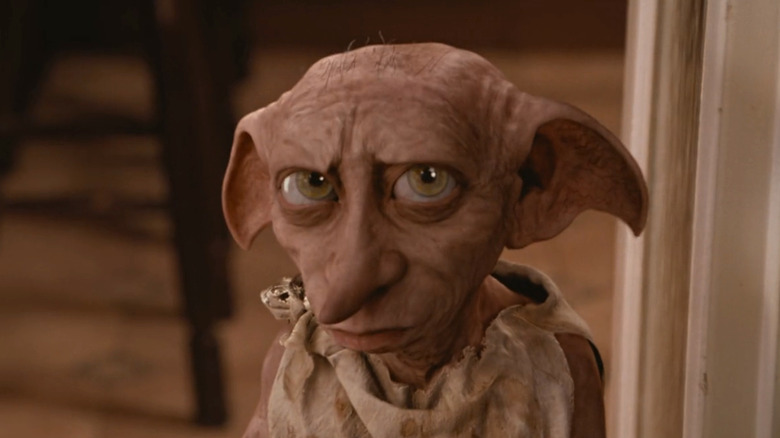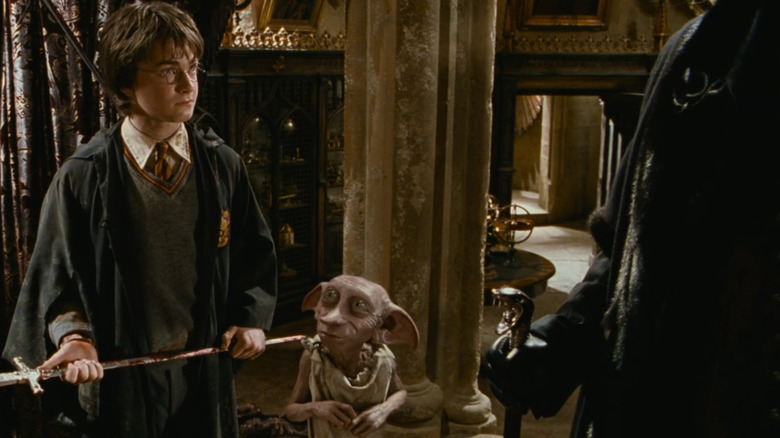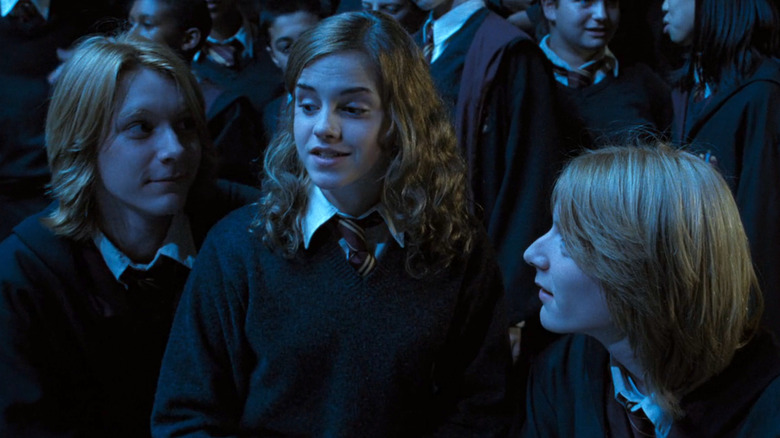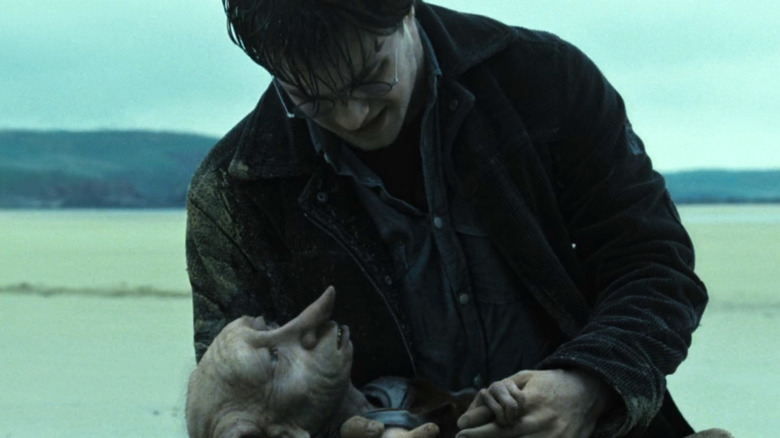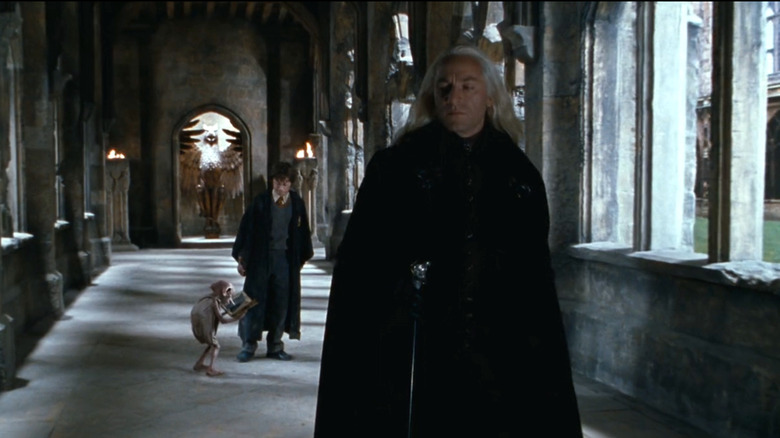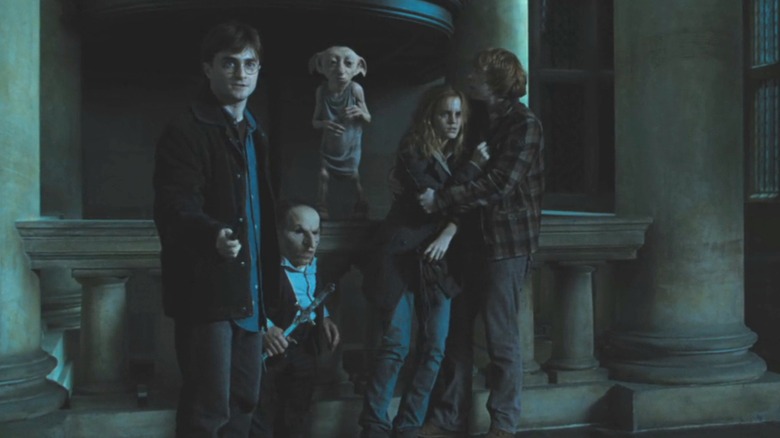Why Harry Potter's Controversial Hermione-House Elves Subplot Is HBO's Biggest Challenge
Although many are skeptical of the upcoming "Harry Potter" TV series from HBO, one upside is that this show will presumably have time to explore all the subplots the original books never got around to. The complicated backstory of the four Marauders? There's time to cover that now. Ron Weasley's triumphs with Quidditch in the later novels? There's time for that too.
But not everything in J.K. Rowling's original books necessarily makes for riveting TV. If you watched the "Harry Potter" movies first and then delved into the books, you'll probably be surprised by how many pages the main characters spend studying for their exams and worrying about house points. There's also a lot more meanness: The central trio (Harry, Ron, and Hermione Granger, of course) is constantly arguing with each other, the overweight characters are mocked ruthlessly by the narrative, and Hogwarts professor Severus Snape's abuse of his Gryffindor students is taken to new extremes.
As HBO goes about its new "Harry Potter" show, it'll have to be strategic about what parts of the books it deems worthy of adapting and which parts the films were actually correct to remove. The most complicated decision its creatives will have to make, no doubt, concerns the books' long subplot about the house elves.
Why the house elf subplot was (and is) so controversial
In the book version of "Harry Potter and the Goblet of Fire," Hermione is shocked to discover the delicious food served at Hogwarts every day is prepared by countless unpaid house elves, creatures who are essentially enslaved in the Wizarding World. Hermione's outrage is inflamed by her interactions with Winky, a house elf who was taken for granted by her master before being fired callously and cast out into the streets. (Winky, notably, doesn't appear in the "Harry Potter" films, but we'll get to that later.) It's also informed by her knowledge of Dobby, a house elf who was abused by the Malfoys and who relishes his freedom after Harry grants it to him in "Chamber of Secrets."
But in a surprise turn of events, Hermione's defense of the house elves is not portrayed positively by the books. Her concerns are immediately dismissed or mocked by the characters around her; not the bad characters, mind you, but by the voice-of-reason characters like Hagrid, who tell her that elves actually love being enslaved. Winky, who turns to extreme alcoholism upon being freed, is presented as an example of what would happen if Hermione's movement to free the elves was a success. This is pretty similar to actual arguments made by enslavers in the Antebellum South, yet it's presented sympathetically by the narrative.
There are certainly kinder interpretations of this subplot (more on that soon), but the critique that this whole storyline is weirdly pro-slavery has only grown more popular over time. A lot of that's due to Rowling's recent anti-trans turn destroying the benefit of the doubt fans were previously willing to give her here, but another reason for it is that fans have grown older and have returned to the novels only to be disturbed by this storyline's implications. After "Chamber of Secrets" so vividly painted a picture of house elves as being cruelly enslaved by human wizards, why pull this switcharoo and portray Hermione as being foolhardy and naive for wanting to free them? And why introduce the concept of enslaved house elves and then never have the status quo be changed (or even challenged) in the later books?
Although most of Hermione's pro-house elf activism takes place in "Goblet of Fire," the debate about house elf rights continues up until "Deathly Hallows." Through the subplot with the house elf Kreacher at Grimmauld Place, the books seemingly conclude that the house elf system is good so long as the masters are nice to the elves. It's presented as a compromise between Hermione's supposedly-radical abolitionism and the Wizarding World's "Who cares about the elves?" general attitude. But for a lot of fans, the books taking such an enlightened-centrist approach to a topic like slavery seems bizarre at best.
In defense of the house elf subplot
Of course, if everyone interpreted the house elf subplot as Rowling being pro-slavery, the "Harry Potter" books probably wouldn't have remained as beloved as they have over the past few decades. There's also the kinder interpretation — namely, that Rowling intended this particular subplot to be a critique of a self-important white-savior style of activism.
Hermione is consistently portrayed as well-meaning throughout the books, but she's also portrayed as unwilling to fully listen to the elves' point of view. When the elves themselves tell her they're happy with their lot in life and don't want what she's selling, she ignores them. All of her efforts to reach out to the elves come across as awkward and offensive to them because she fails to properly listen to the marginalized group she's advocating for.
Hermione is also a bad activist because she's bad at messaging. The name she comes up with for her elf freedom group is "S.P.E.W.," accidentally likening itself to a slang word for vomit. In every translation of the novel, S.P.E.W. is changed to match a similarly unpleasant word with negative connotations.
It's easy to read this storyline not as an endorsement of slavery but as critique of a certain type of naive, self-important activist. The type of activist Hermione's caricaturing is indeed a type that exists in the real world and probably deserves a little bit of mockery. Interpreting Rowling's choices charitably (something, admittedly, Rowling herself has made difficult to do these days), it's easy to read this storyline as primarily being about Hermione's youth and inexperience. She wants to make the world a better place, but hasn't yet figured out how to pick her battles and how to fight them effectively. As such, the subplot's a critique of her approach to activism and not necessarily what she believes in.
How did the movies handle this storyline? They didn't
At first glance, it seems like the decision the "Harry Potter" TV show should make is an easy one: Just cut the house elf storyline, right? But the issue is that when the movies took this approach, it caused some unexpected negative ripple effects on the later entries.
After all, Hermione's S.P.E.W. storyline in "Goblet of Fire" is strongly intertwined with the reappearance of Dobby. The latter plays a significant role in "Goblet of Fire," returns in "Order of the Phoenix" and "Half-Blood Prince," and then dies tragically in "Deathly Hallows." In that book, Dobby's death has an impact because we've gotten to know him beyond his annoying presence in "Chamber of Secrets." His death was sad because we'd actually come to like him.
In the movies, the cut S.P.E.W. storyline also meant a cut Dobby storyline. In fact, Dobby disappeared entirely from the movies before returning awkwardly in "Deathly Hallows: Part 1" mere minutes before his death. Not only did the lack of Dobby's presence in previous films make his sudden appearance here feel like a deus ex machina, but it also made his death feel empty to viewers unfamiliar with the books. It's weird to see Harry sobbing over Dobby's corpse because, well, the movie version of Harry barely even knew him.
Even beyond Dobby, cutting S.P.E.W. from the movies was an issue because it simultaneously removed so much world-building. It's through the house elves that we learned about the Crouch family, not to mention the inner workings of Hogwarts. The storyline's also the readers' first true glimpse of the rot at the core of the Wizarding World; the books slow-roll Harry's disillusionment with those in charge of the wizards' society, peeling back layer after layer until "Order of the Phoenix" fully breaks his trust in the Ministry of Magic. The films, meanwhile, saved it all for the fifth movie, making the Ministry's sudden authoritarian turn feel somewhat jarring.
How will the TV show handle the house elf storyline?
Although the movies' failures might serve as an argument for including S.P.E.W., it seems likely the "Harry Potter" TV show will also steer clear of the subject. The safest option, a lot of fans seem to agree, is for the series to avoid such a messy, uncomfortable storyline.
Indeed, everything we've learned about the TV series so far indicates its creatives are playing things safe. It really doesn't seem like they're deviating from the general aesthetics of the movies, while their casting choices appear to be similarly motivated by a desire to be faithful to the "Harry Potter" films more than the books (see also: Nick Frost's appearance as Hagrid). It doesn't help that the movies were undeniably successful, so it's not clear at all to what extent the show should veer from them.
There's also the general trend of adaptations smoothing over the rougher (and more interesting) parts of their source material. The Netflix adaptation of "The Sandman," for instance, has seemed terrified of allowing its title character to be a jerk like he often is in the comics. Similarly, FX's adaptation of "Shōgun" has watered down most of the reactionary views its protagonist has at the start of the original book. On the whole, modern TV adaptations seem unwilling to risk being misunderstood by some of their viewers, and this is a storyline ripe for misunderstanding.
How should the TV show handle the storyline?
For me, the big reason the house elf storyline in the books falls flat is because it sort of fizzles out with no proper resolution. "All was well," to quote the final line from "Deathly Hallows," but the house elf situation does not end well. "Order of the Phoenix," the boldest and most nuanced entry in the series, is the book that seems most comfortable with grappling with the idea that Voldemort's return to power is a symptom of a larger rot in wizarding society. It also raises the idea that it's not just Voldemort that needs to go, but the Ministry itself also needs some major reforms.
Yet, by the time "Deathly Hallows" draws to a close, that idea's been largely dropped. Voldemort being defeated is the happy ending, and nobody seems to mind when the Ministry goes back to operating exactly the way it did before, with no structural changes in place to prevent some new Dark Lord from rising in another generation or so.
This feels like an opportunity for the TV show to change things, assuming it lasts long to get to that part of the story. Maybe instead of Hermione being forced to settle for some lip service in favor of the house elves like she does in the books, Hermione in the TV show can achieve some form of meaningful reform. Elf slavery doesn't need to be solved entirely by the end of the show, but perhaps Hermione's activism can lead to some sort of regulation at least (so that human wizards will no longer be able to mistreat their elves the way the Malfoys did with Dobby). Hermione's activism achieving something, even if it doesn't fix the problem entirely, could go a long way.
The "Harry Potter" TV series is slated to premiere in 2027 on HBO and HBO Max.
